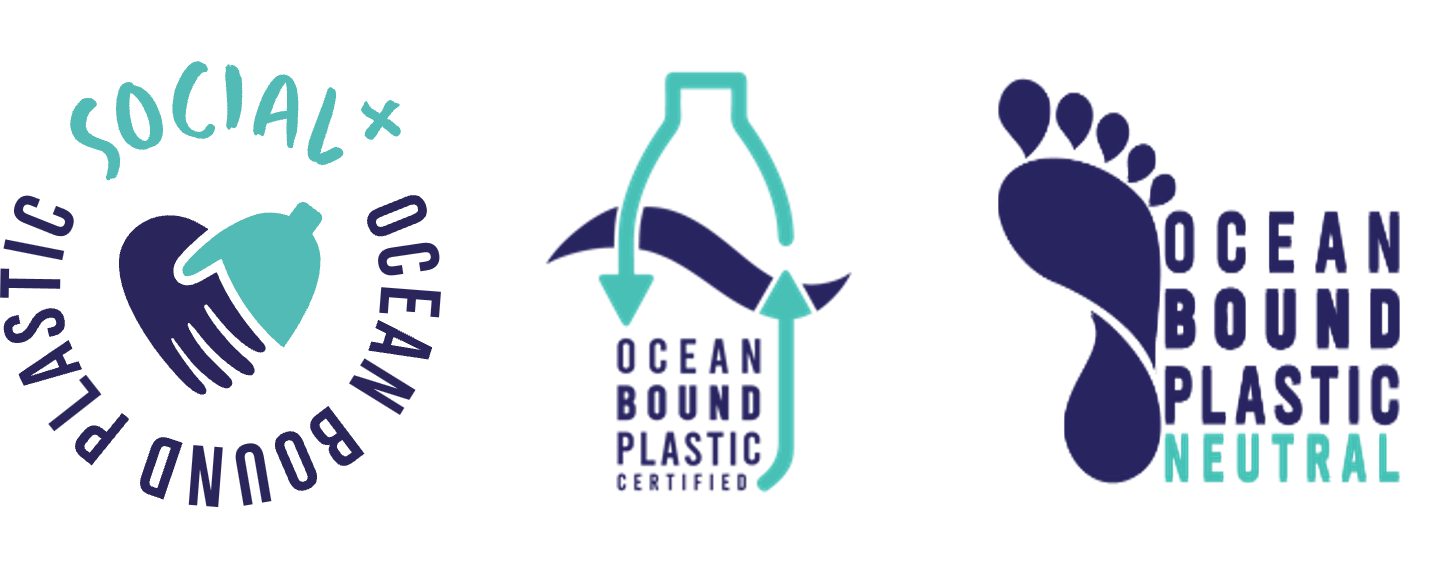1. Ocean Bound Plastic definitions
What does Ocean Bound Plastic (OBP) mean?
Ocean Bound Plastic (OBP) is plastic waste defined as “at risk of ending up in the ocean”. OBP is estimated to generate 80% of plastic marine litter. It includes:
- a small fraction of commercially recyclable plastic waste
- a lot of non-commercially recyclable plastic waste
OBP was indirectly defined by Jenna Jembeck et al. in a Science publication. Based on this literature and consultations with peer groups, ZPO summarized it as: “abandoned plastic waste (microplastics, mezzo-plastics and macro-plastics), located in a maximum range of 50km from shores, where waste collection is inexistent or insufficient”. ZPO’s standards additionally subdivide OBP in four categories: Potential OBP, Waterways OBP, Shoreline OBP and Fishing materials OBP.
Please refer to our complete definition of OBP here.
Note: The above definition naturally excludes already collected waste, hence, plastic waste located in a landfill or a managed dumpsite, is not considered OBP. However, when found in an uncontrolled, or informal dump site (which is equivalent to being abandoned in the environment), there is high risk of leakage to waterbodies so this waste is considered OBP.
What are the four categories of Ocean Bound Plastic (OBP)?
While developing the OBP certification scheme, ZPO identified the need to create specific OBP categories. This allows projects collecting OBP and brands buying it, to tailor their impact with greater precision. The four categories available are:
–Potential OBP (abandoned plastic waste located within 50 km from shores);
–Waterways OBP (abandoned plastic waste collected within rivers and within 200m on riverbanks);
–Shoreline OBP (abandoned plastic waste collected within 200m from high tide line and 100m from low tide line);
–Fishing Materials OBP (plastic caught as bycatch and incentivized collection of plastic waste from the fishing industry).More details about our categories can be found here in the extended OBP definition.
Is Ocean Bound Plastic (OBP) a trademark?
Ocean Bound Plastic is not a trademark. The terminology “Ocean Bound Plastic” is used freely by organizations around the world. Zero Plastic Oceans is the owner of the “OBP Certification Program” and its associated logotypes, documentation, and concept.
2. Ocean Bound Plastic collection and usages
Is it better to collect marine debris (Ocean Plastic) or Ocean Bound Plastic (OBP)?
Marine debris is plastic waste spread in the ocean, floating highly dispersed on the sea surface, or sunk on the sea bottom.
OBP is plastic waste abandoned on land and at risk of entering the ocean (potential, shoreline, and waterways categories). Additionally, ZPO considers in the fishing material OBP category waste recovered from the fishing industry to prevent abandonment at sea and plastic caught as bycatch to prevent that it is thrown back at sea again.
The differences between collecting marine debris/OP or OBP can be compared on the following aspects:
- Cost and efficiency of collection
Collecting marine debris is very costly and requires a lot of energy (CO2 emissions) because it is far to reach and very dispersed. The efficiency is limited to what is still floating, which is the lesser portion.
Collecting OBP is naturally more cost effective, and it is possible to collect all of it, especially when using our OBP Neutrality Subprogram that gives value to no value plastic waste through OBP credits.
Note: The particular case of the inclusion of plastic bycatch (unvoluntary collection of marine debris by fishermen) in the Fishing Material OBP Category was motivated precisely because this collection, by its opportunistic nature remains very cost and resource efficient.
- Circularity potential
Marine debris will naturally be more degraded by UVs and salty water than OBP that is captured on land or through incentivized recovery schemes, hence there is a higher probability of recycling OBP.
- Common sense
All efforts to rid oceans of plastic pollution are laudable, however collecting this plastic while large quantities are still being discharged into the ocean is like mopping the floor without closing the tap.
If local governments are responsible for collecting waste, why should companies or NGOs be involved in this mission through the collection of Ocean Bound Plastic (OBP)?
Local government entities are indeed responsible for waste collection and management. However, many areas in the world suffer from insufficient budgets to be able to offer adequate waste collection and management services. Hence, a considerable amount of (plastic) waste remains abandoned in the streets or in the environment. OBP, by definition, refers to plastic waste escaping the current collection reach and therefore targets only this waste that remains abandoned.
It is a complement, not a replacement, and it is meant to be temporary. Indeed, as local waste collection and management services improve over time, the OBP supply will be reduced, hopefully soon to none.
If Ocean Bound Plastic (OBP) is dirty or damaged, can we recycle it?
OBP is mainly collected from nature, open areas, rivers, shores, or streets/surroundings of urbanized areas. This means it is usually somewhat degraded due to sunlight, abrasion, or other environmental factors. This degradation reduces the recyclability but still a lot of collected OBP enters the circular economy and as recycling technologies improve, we will be able to give a second life to more of it.
This highlights the importance of the complementary solution developed by ZPO: the OBP Neutrality Subprogram. This Subprogram focuses exclusively on collecting what cannot be economically recycled, (commercially non-recyclable OBP), giving it a value through the sale of OBP credits. It is essential to combine both approaches to ensure the collection of ALL OBP, bringing higher social and environmental benefits.
Is recycled Ocean Bound Plastic (OBP) toxic?
OBP is not a different plastic type or polymer, therefore its innocuity or toxicity will be the same as other plastics and recycled plastics. The extra residence time in the environment does generate an environmental impact but it is not expected to modify the potential toxicity of the polymers or additives themselves in the context of recycling.
3. Ocean Bound Plastic (OBP) Environmental and social impacts
How do we ensure that when buying an Ocean Bound Plastic (OBP) Recycled or OBP Neutral product we have a positive impact on the environment?
Recycled OBP products
Products with a certified recycled content of OBP, have been made in compliance with the strict OBP definitions and requirements of the OBP standard and the whole process is verified by third party auditors. Giving a second life to this plastic means that plastic waste has been removed from the environment and that you support a traceable and ethical value chain thanks to your purchase. Additionally, when the OBP collected is recycled into new products, the purchase of these products, in addition to protecting oceans, reduces CO2 footprints compared to purchasing a product made of virgin plastic.OBP Neutral products
OBP Neutral products, have been compensated through the purchase of OBP Credits which represent the collection and treatment of OBP waste without commercial value (not commercially recyclable). Therefore, when you purchase an OBP Neutral product you directly remove from the environment the same weight of no value plastic waste.This represents a very positive environmental impact because without your purchase this OBP would never have been collected by anyone (because it has no buyers).
What is the social impact of the Ocean Bound Plastic (OBP) value chain?
The OBP certification program requires member-certified organizations of all the value chain to comply with specific social requirements such as:
- Fair purchase prices to collectors
- No child labor
- No forced or bonded labor
- Fair wages for workers,
- Compliance with laws and regulations
Additionally, certified OBP waste does have an additional value when compared to other plastic waste allowing certified companies to share some of this added value with collectors.
Hence, OBP certified products additionally from the environmental impact also have a positive social impact ensuring actors of the value chain are fairly and ethically treated.
How do we ensure Ocean Bound Plastic (OBP) supply chains are not relying on child labor, forced labor and other unethical sourcing?
Certified organizations must comply with social standards that forbid the practices mentioned above. This is verified through on-site annual audits that include interviews with organization personnel, waste pickers and small collectors, as well as documentary (footages, pictures, documentation) evidence to demonstrate compliance.
4. Certification requirements for using OBP Logos
I’m purchasing OBP products from a certified supplier, do I need to get certified to resell them?
Case A (B2C):
You are reselling final certified OBP products (products are already labelled with an OBP On-product Claim by your supplier) to final consumers either directly or indirectly.
- You don’t need to get certified to resell final, already labelled OBP products (no modifying or relabelling of the OBP logo would be allowed).
- You need to get certified to the Brand Standard if you want the right to make promotional claims of your organization and your products (using the OBP logo on your marketing materials).
Case B (B2B):
You are acting as a trader, and your clients are certified OBP companies that need to purchase certified OBP products for transformation into new products that will use the OBP label.
- You need to get certified as a trader with the Recycling Organization Standard (OBP-REC-STD). If you do not have a valid certificate your clients will lose the right to make claims as the chain of custody will be broken.
Case C (B2B):
You are acting as a trader selling OBP certified products to companies that are not OBP certified and will not make any OBP claims.
- You don’t need to get certified as your clients are not making certified OBP claims.
I’m purchasing certified OBP product from a certified OBP supplier, can I use the OBP logo on my website/catalogue/brochures?
The OBP logo can only be used when the related claims are verified and certified by a third party (the certification body). If you want the right to use the logo, you need to get certified with the Brand standard. This standard is relatively straightforward and ensures claims are representative of the real OBP activity. Additionally, for European companies, it will ensure compliance with the future green claim directives as your claims are third party validated.

